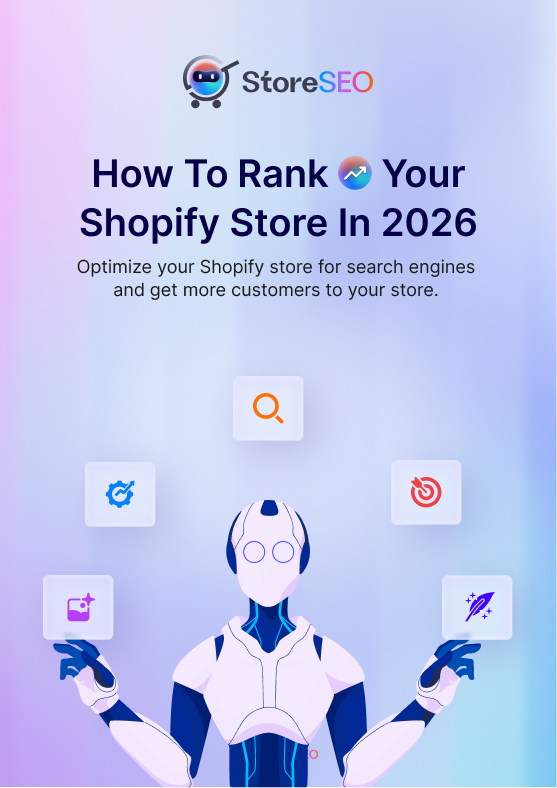Search engine optimization is one of the most important parts of getting Shopify success. Once you know the ins and outs of Shopify SEO, you can easily drive traffic to your store and convert them to your customers. In this article, we are going to discuss how you can become a Shopify SEO expert and acquire the key skills. Without further ado, let’s get started.

💡 What Does Shopify SEO Expert Mean?
Being a Shopify SEO expert means mastering the art of optimizing Shopify stores for ranking better in search engine results pages. It is about creating SEO techniques for Shopify stores to maximize visibility, traffic, and, eventually, revenue.
From keyword research and on-page optimization to technical SEO and content marketing, a Shopify SEO specialist understands how to fine-tune every aspect of a Shopify store to attract organic traffic and outperform competitors.
⭐ Required Skills For Shopify SEO Expert
Now, let’s have a look at the key skills that you should have to become an SEO expert. Don’t worry. We will help you with all the resources you need to become a Shopify SEO expert below.
- Comprehensive understanding of SEO: Mastery of on-page, technical, and off-page SEO principles, as well as their combined impact on site performance.
- Understanding of Search Engine Operations: Knowledge of how search engines and SERPs work, including indexing and crawling.
- SEO Research Capabilities: Expertise in SEO-focused research, such as keyword research and competitor analysis.
- Analytics Interpretation: The capacity to understand, evaluate, and report on SEO analytics data in order to make data-driven decisions and recommendations.
- Proficiency with SEO Tools: Knowledge of numerous SEO tools, such as Ahrefs or Google Search Console, to help with research, analysis, and optimization efforts.
- Content Optimization Skills: Understanding how to develop SEO-friendly content that matches search intent and drives organic traffic.
📖 How to Become SEO Expert For Shopify
When it comes to being an expert in something, you must have extensive knowledge and experience with the subject. To become a Shopify SEO specialist, you must have both theoretical understanding and practical experience with SEO.

Thanks to Shopify’s compact SEO features, it is very easy to optimize any store for search engine optimization. Besides, it has many beginner-friendly SEO apps that will help you optimize your store without any hassle. In this section, we are going to provide a roadmap for you to become an SEO expert for Shopify.
⭐ Learn The SEO Basics
SEO is not a one time task but rather an ongoing process that includes a variety of methods and techniques. It starts with keyword research, which identifies the terms and phrases that your target audience is looking for on the search engines.
Next, On-page SEO includes making your website’s content, meta tags, and structure more search engine friendly. Another important part is backlink building, which is acquiring links from other credible websites in order to increase your site’s authority and rank.
In addition, technical SEO focuses on optimizing your website’s technical features, such as site speed, mobile friendliness, and crawlability, to assure top performance in search results. Mastering these core ideas can help you become a Shopify SEO specialist and attract organic traffic to your website.
Now, how do you learn all that stuff? Well, to help you out we have created a complete SEO guide for Shopify to help you understand all the key concepts of SEO. Get your copy and start learning the basics of SEO first to become a Shopify SEO expert.
⭐ Take Help From Shopify SEO Apps
Shopify has an app store that includes additional functionalities for your store. It has many SEO solutions to help you optimize your store with step-by-step instructions. When it comes to beginner-friendly SEO solutions, StoreSEO comes top of all.
It is a complete SEO solution for Shopify that will help you optimize your Shopify store, similar to an expert with detailed instructions. It has excellent features such as keyword research, SEO optimization, sitemap updates, Google integration, and many more. Using these tools, you may optimize your store without the assistance of a professional and generate traffic for your Shopify store.
⭐ Get Familiar With Analytics
Understanding website analytics is essential for tracking the success of your SEO campaigns and making data-driven decisions. Analytics tools like Google Analytics can provide vital information about your website’s performance, such as traffic sources, user activity, and conversion metrics. You can get familiar with analyzing these data to detect patterns, track progress toward your goals, and find areas for improvement for your store.

Thanks to StoreSEO, an SEO app that offers direct Shopify store integration with Google Analytics to help you find all the important data from your Shopify dashboard. So, as an SEO expert, you can easily collect all the data and make the necessary adjustments for your SEO strategy.
⭐ Research & Test Your SEO Strategy
Researching and testing your SEO strategy is important since search engine optimization strategies are constantly evolving. While continuous research can help you find effective tactics for your store, with performance reports you can identify the areas for improvement and make educated decisions.
As a Shopify SEO expert, you need to have enough knowledge to make decisions for adapting your SEO strategy. Once you spend enough time researching and testing your SEO strategy, you can easily learn what’s working for your store or not.
⭐ Stay Updated With SEO Trends
Search engines like Google constantly update their algorithms to ensure the best search experience for visitors. If you want to become a Shopify SEO expert, you need to be aware of the constantly changing algorithms. You can keep an eye on social media or SEO forums to stay updated with all the latest trends. Besides, you can subscribe to our blog for the latest SEO strategies as well.
⁉️ Frequently Asked Questions
Before ending this blog we want to answer some of the most common questions related to becoming an SEO expert. Let’s have a look at them below.
❓ How long does it take to become an SEO expert?
Becoming an SEO expert is a continuous journey rather than a fixed timeline. It depends on factors such as your starting knowledge, learning pace, and the depth of expertise you aim to achieve. In general, developing an adequate understanding and skill in SEO might take anything from a few months to several years.
❓How can I be an SEO expert?
To become an SEO expert, you need to invest time in learning and mastering various aspects of SEO. Start by familiarizing yourself with basic concepts like on-page optimization, keyword research, and analytics interpretation. Then, gradually move to more advanced topics such as technical SEO, content marketing, and link building. Hands-on experience, continuous learning, and staying updated with industry trends are crucial to becoming an SEO expert.
❓What qualifications do I need to become an SEO expert?
Unlike traditional jobs, SEO expertise does not always require specific certificates or degrees. You can start by knowing nothing about SEO. However, a solid background in digital marketing, computer science, or a related sector can be helpful. Furthermore, certifications like Google Analytics and Google Ads can indicate your expertise in specific areas of SEO.
❓Do I need coding knowledge to be an SEO expert?
While coding expertise can be useful, it is not a must for becoming an SEO specialist. Understanding basic HTML and CSS can aid with technical SEO tasks like optimizing website structure and resolving crawl issues. However, many SEO tasks can be completed using SEO apps.
⚡ Become SEO Expert & Get Shopify Success
Search engine optimization is one of the key factors in getting success in Shopify. Now that you have learned how to become a Shopify SEO expert, it is time to put that knowledge into action. Follow our recommended resources and kickstart your journey toward Shopify success today!
Have you found our blog useful? If you do, please subscribe to our blog for more tips, tutorials, and updates on industry-related topics.











